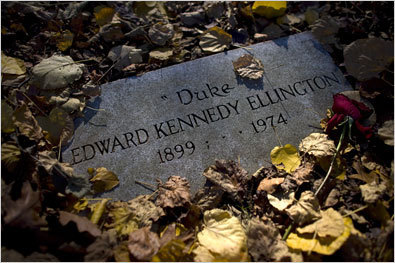Terry Teachout's Blog, page 108
January 13, 2013
TT: Almanac
Henry James, notes for The Ivory Tower
January 10, 2013
TT: Too true to be good?
* * *
Few entries in the annals of conversion sound quite so implausible on first acquaintance as that of C.P. Ellis, a North Carolina gas-station operator who, having joined the Ku Klux Klan and attained in due course the lofty rank of Exalted Grand Cyclops, decided to hang up his robe and become an advocate for school desegregation. Mr. Ellis, who died in 2005, isn't nearly so well remembered as he ought to be, but Studs Terkel wrote him up a couple of times, and he was also the subject of a 1996 biography, Osha Gray Davidson's "The Best of Enemies: Race and Redemption in the New South." Now Mark St. Germain, the author of "Freud's Last Session," has used Mr. Davidson's book as the basis for a four-person play, also called "The Best of Enemies," which was premiered three years ago by Massachusetts' Barrington Stage Company and is currently making the regional rounds. I caught up with it in Sarasota, a city that once upon a time was a burgeoning center of Klan activity, and found it to be both an engrossing piece of theatrical journalism and a vehicle for a quartet of top-notch actors.
 Florida Studio Theatre has most definitely got the actors, starting with Sheffield Chastain, who couldn't possibly be better as Mr. Ellis, a hard-tack cracker who in his benighted youth didn't blink at referring to the Rev. Martin Luther King, Jr., as "Martin Lucifer Coon." While Mr. Chastain's performance isn't exactly subtle--Mr. Ellis, after all, wasn't a subtle person--it's as believable as a clip from a cinéma-vérité documentary....
Florida Studio Theatre has most definitely got the actors, starting with Sheffield Chastain, who couldn't possibly be better as Mr. Ellis, a hard-tack cracker who in his benighted youth didn't blink at referring to the Rev. Martin Luther King, Jr., as "Martin Lucifer Coon." While Mr. Chastain's performance isn't exactly subtle--Mr. Ellis, after all, wasn't a subtle person--it's as believable as a clip from a cinéma-vérité documentary....Mr. Ellis' story, astonishing though it seems at first glance, turns out to be rather too linear to be truly dramatic. His journey from monstrosity to enlightenment contains no backward steps and, as dramatized by Mr. St. Germain, few lingering doubts. We meet C.P. in his KKK days, we watch him acting like a jerk, we see him change his mind, and all at once he's not a racist anymore. Nor is the outcome in any way surprising, for the audience knows going in what's going to happen, having previously been alerted that it's about to see "a true story" (a phrase that not only appears on the cover of the program but is projected on the back wall of the set). We are, in other words, gathered together to witness a heartwarming tale of redemption, the kind of thing that is the stuff of countless made-for-TV movies. The only difference--and it's a big one--is that it's true. If it weren't, you'd be rolling your eyes all night long.
But "The Best of Enemies," of course, is true, and while it's not "exciting" in the ordinary sense of the word, the results are as fascinating as an absolutely first-rate magazine story....
* * *
Read the whole thing here .
Mark St. Germain talks about The Best of Enemies:
TT: Almanac
Shakespeare, Twelfth Night
TT: So you want to see a show?
Here's my list of recommended Broadway, off-Broadway, and out-of-town shows, updated weekly. In all cases, I gave these shows favorable reviews (if sometimes qualifiedly so) in The Wall Street Journal when they opened. For more information, click on the title.
BROADWAY:
• Annie (musical, G, nearly all performances sold out last week, reviewed here)
• Dead Accounts (serious comedy, PG-13, closes Feb. 24, reviewed here)
• The Mystery of Edwin Drood (musical, PG-13, closes Mar. 10, reviewed here)
• Once (musical, G/PG-13, all performances sold out last week, reviewed here)
• Who's Afraid of Virginia Woolf? (drama, PG-13/R, reviewed here)
OFF BROADWAY:
• Avenue Q (musical, R, adult subject matter and one show-stopping scene of puppet-on-puppet sex, reviewed here)
• The Fantasticks (musical, G, suitable for children capable of enjoying a love story, reviewed here)
CLOSING SOON ON BROADWAY:
• Evita (musical, PG-13, closes Jan. 26, many performances sold out last week, reviewed here)
CLOSING SOON IN BOSTON:
• Our Town (drama, G, remounting of off-Broadway production, closes Jan. 25, original production reviewed here)
CLOSING SOON IN FORT MYERS, FLA.:
• The Little Foxes (drama, PG-13, closes Jan. 26, reviewed here)
CLOSING NEXT WEEK ON BROADWAY:
• Glengarry Glen Ross (drama, R, closes Jan. 20, nearly all performances sold out last week, reviewed here)
• Golden Boy (drama, PG-13, closes Jan. 20, reviewed here)
CLOSING NEXT WEEK OFF BROADWAY:
• The Freedom of the City (drama, PG-13, closes Jan. 20, reviewed here)
• Tribes (drama, PG-13, closes Jan. 20, reviewed here)
CLOSING SUNDAY OFF BROADWAY:
• The Piano Lesson (drama, PG-13, reviewed here)
• Golden Age (comedy, PG-13, reviewed here)
• The Great God Pan (drama, PG-13, reviewed here)
• Vanya and Sonia and Masha and Spike (comedy, PG-13, reviewed here)
January 9, 2013
TT: The great work ends (for now)
 I finished writing the first draft of Duke: A Life of Duke Ellington on Wednesday afternoon. Much painstaking revision remains ahead of me, but the main body of work on the book, my fourth and longest biography, is now complete.
I finished writing the first draft of Duke: A Life of Duke Ellington on Wednesday afternoon. Much painstaking revision remains ahead of me, but the main body of work on the book, my fourth and longest biography, is now complete.When I was done, Mrs. T and I went for a walk along the beach and watched the sun set over the Gulf of Mexico. I thought about many people and many things, and I remembered my mother, who did not live to see this day. Then we came back to our cottage, changed clothes, and went out to dinner to celebrate.
I wrote the last chapter of Pops: A Life of Louis Armstrong first, and it ends with a sentence drawn from an essay that was published in 2001, a few years before I had any idea that I would someday write a biography of Louis Armstrong. Not so Duke, whose closing paragraphs were the very last thing that I wrote. Here they are.
* * *
Unlike some great artists, Ellington underwent no posthumous decline in his reputation. His recordings continued to be reissued and his songs continued to be played and sung, though the critics would never stop wrangling over their comparative importance. While a small but influential group of commentators, most notably Stanley Crouch, have plumped in recent years for his later work, the vast majority of Ellington's critics still agree that he was at his best in the early Forties. In 1989 Gunther Schuller finally got around to publishing The Swing Era, the long-awaited sequel to Early Jazz, in which he confronted the later large-scale works and predictably found them wanting: "Ellington never fully succeeded in his almost lifelong quest to express himself in larger, not just longer, forms....he never really understood the nature of the problem he was facing in undertaking to write in larger forms." It is a verdict in which most scholars concur, though it does not diminish his stature in the least: he was, like Chopin, Paul Klee, Jorge Luis Borges, and Flannery O'Connor, a true petit maître, a disciplined lyric miniaturist who knew how to express the grandest of emotions on the smallest of scales, and who needed no more room in which to suggest his immortal longings.
 If anyone doubts that he still matters, one need only look at the way in which America's cultural institutions now treat him. In 1987 Jazz at Lincoln Center joined the Metropolitan Opera, New York City Ballet, the New York City Opera, the New York Philharmonic, Lincoln Center Theater, the Juilliard School, and the School of American Ballet as a constituent of America's biggest and most influential performing-arts center, and Wynton Marsalis, the co-founder, placed Ellington's music at the heart of its programming. His musical manuscripts and personal papers were acquired the following year by the Smithsonian Institution, which now watches over them with scrupulous and loving care. He even made it to Broadway at last with Sophisticated Ladies, a 1981 revue based on his songs that ran for 767 performances. And in 1999 he got his Pulitzer, a special award "bestowed posthumously on Edward Kennedy 'Duke' Ellington, commemorating the centennial year of his birth, in recognition of his musical genius, which evoked aesthetically the principles of democracy through the medium of jazz and thus made an indelible contribution to art and culture."
If anyone doubts that he still matters, one need only look at the way in which America's cultural institutions now treat him. In 1987 Jazz at Lincoln Center joined the Metropolitan Opera, New York City Ballet, the New York City Opera, the New York Philharmonic, Lincoln Center Theater, the Juilliard School, and the School of American Ballet as a constituent of America's biggest and most influential performing-arts center, and Wynton Marsalis, the co-founder, placed Ellington's music at the heart of its programming. His musical manuscripts and personal papers were acquired the following year by the Smithsonian Institution, which now watches over them with scrupulous and loving care. He even made it to Broadway at last with Sophisticated Ladies, a 1981 revue based on his songs that ran for 767 performances. And in 1999 he got his Pulitzer, a special award "bestowed posthumously on Edward Kennedy 'Duke' Ellington, commemorating the centennial year of his birth, in recognition of his musical genius, which evoked aesthetically the principles of democracy through the medium of jazz and thus made an indelible contribution to art and culture."Everyone knows him--and no one knows him. That was the way he had wanted it. "To the very end, he made sure he left nothing behind that would let people know the real Duke Ellington," Norman Granz said. But he had: he left behind his music, the only mistress to whom he told everything and was always true.
* * *
Duke Ellington plays his "Reflections in D" in 1953:
TT: Almanac
Shakespeare, King Lear
January 8, 2013
TT: Snapshot
(This is the latest in a series of arts-related videos that appear in this space each Monday and Wednesday.)
TT: Almanac
Robert Louis Stevenson, "Crabbed Age"
January 7, 2013
TT: Lookback
Life is unfair, and I know I have gifts that others envy. I had a friend in high school who was completely tone-deaf--he couldn't carry a tune in a bucket, as the saying goes--and who was desperately jealous of my musical talent. I wouldn't trade my musicality for anything (though I'd hate to have to choose between going deaf and going blind). But what would I give to be able to speak and read French fluently? A year off my life? The little finger of my right hand? Probably neither, but certainly something of value, were the Devil to drop by one evening and suggest a little deal. I might, for instance, agree never to read The Great Gatsby again in return for the ability to read Proust in the original. Maybe.
One thing's sure, though: I wouldn't give up anything at all in order to be able to play competition-level Scrabble....
Read the whole thing here .
TT: Almanac
Shakespeare, Richard II
Terry Teachout's Blog
- Terry Teachout's profile
- 45 followers



